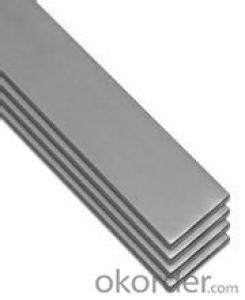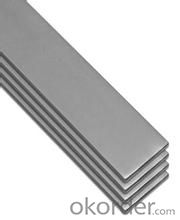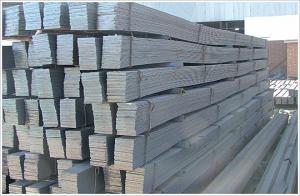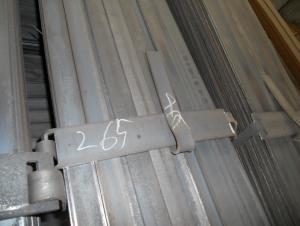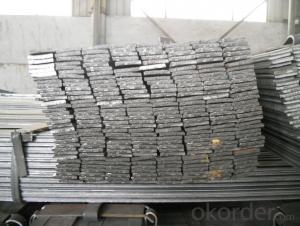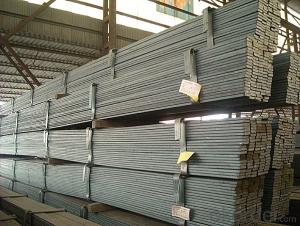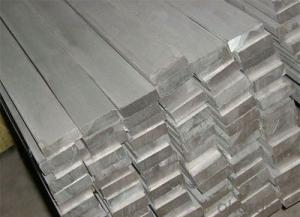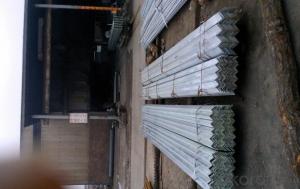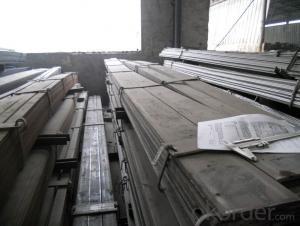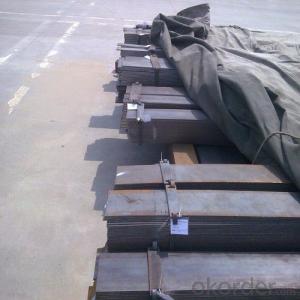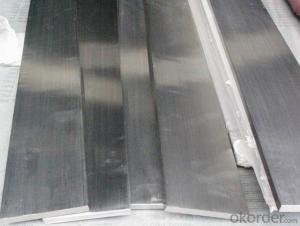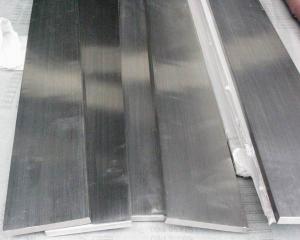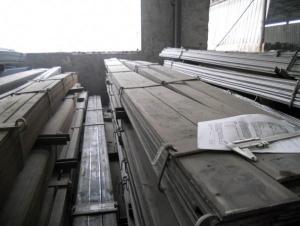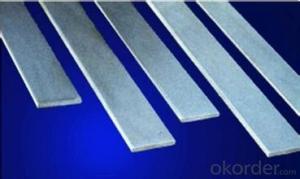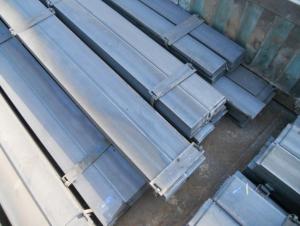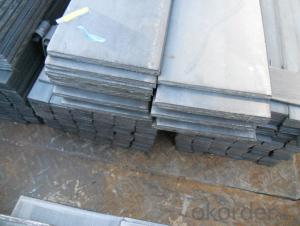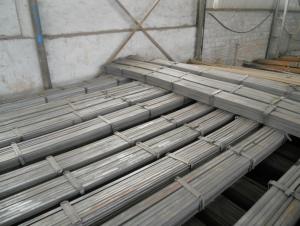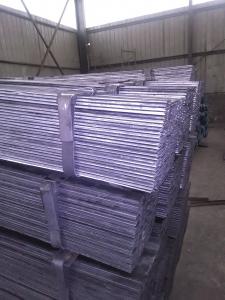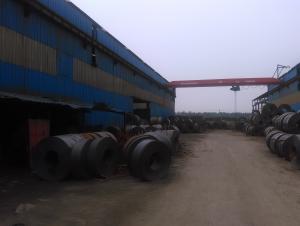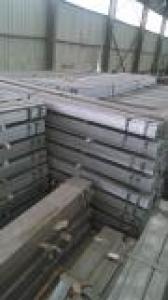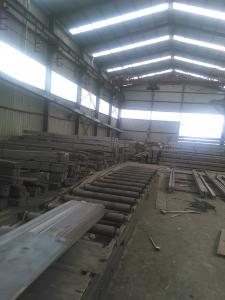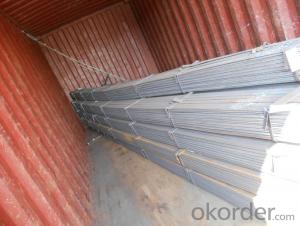Flat Steel High quality Hot rolled 20mm*3mm*6m
- Loading Port:
- Tianjin
- Payment Terms:
- TT or LC
- Min Order Qty:
- 25 m.t.
- Supply Capability:
- 12000 m.t./month
OKorder Service Pledge
OKorder Financial Service
You Might Also Like
Product Description:
OKorder is offering Flat Steel High quality Hot rolled 20mm*3mm*6m at great prices with worldwide shipping. Our supplier is a world-class manufacturer of steel, with our products utilized the world over. OKorder annually supplies products to European, North American and Asian markets. We provide quotations within 24 hours of receiving an inquiry and guarantee competitive prices.
Product Applications:
Flat Steel High quality Hot rolled 20mm*3mm*6m are ideal for structural applications and are widely used in the construction of buildings and bridges, and the manufacturing, petrochemical, and transportation industries.
Product Advantages:
OKorder's Flat Steel High quality Hot rolled 20mm*3mm*6m are durable, strong, and resist corrosion.
Main Product Features:
· Premium quality
· Prompt delivery & seaworthy packing (30 days after receiving deposit)
· Corrosion resistance
· Can be recycled and reused
· Mill test certification
· Professional Service
· Competitive pricing
Product Specifications:
Manufacture: Hot rolled
Grade: Q195 – 235
Certificates: ISO, SGS, BV, CIQ
Length: 6m – 12m, as per customer request
FAQ:
Q1: Why buy Materials & Equipment from OKorder.com?
A1: All products offered byOKorder.com are carefully selected from China's most reliable manufacturing enterprises. Through its ISO certifications, OKorder.com adheres to the highest standards and a commitment to supply chain safety and customer satisfaction.
Q2: How do we guarantee the quality of our products?
A2: We have established an advanced quality management system which conducts strict quality tests at every step, from raw materials to the final product. At the same time, we provide extensive follow-up service assurances as required.
Q3: How soon can we receive the product after purchase?
A3: Within three days of placing an order, we will begin production. The specific shipping date is dependent upon international and government factors, but is typically 7 to 10 workdays.
Q4: What makes stainless steel stainless?
A4: Stainless steel must contain at least 10.5 % chromium. It is this element that reacts with the oxygen in the air to form a complex chrome-oxide surface layer that is invisible but strong enough to prevent further oxygen from "staining" (rusting) the surface. Higher levels of chromium and the addition of other alloying elements such as nickel and molybdenum enhance this surface layer and improve the corrosion resistance of the stainless material.
Q5: Can stainless steel rust?
A5: Stainless does not "rust" as you think of regular steel rusting with a red oxide on the surface that flakes off. If you see red rust it is probably due to some iron particles that have contaminated the surface of the stainless steel and it is these iron particles that are rusting. Look at the source of the rusting and see if you can remove it from the surface.
Images:
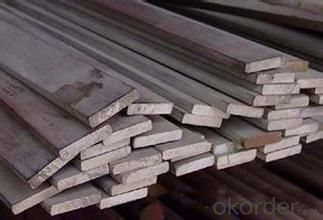
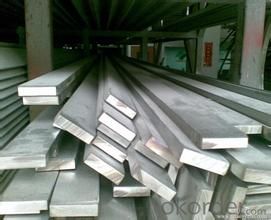
- Q: Are steel flat bars suitable for making machine frames or structures?
- Yes, steel flat bars are suitable for making machine frames or structures. Steel flat bars are strong, durable, and versatile, making them ideal for providing stability and support in various applications. They can be easily welded, bent, or cut to the required shape, allowing for customizability in frame or structure design. Additionally, steel flat bars offer good load-bearing capabilities and resistance to deformation, ensuring the integrity and longevity of the machine frames or structures.
- Q: How do steel flat bars compare to other forms of steel like angles or channels?
- Various industries and applications utilize steel flat bars, angles, and channels as popular steel forms. Despite sharing the same material, they differ in shape and structural properties. Rectangular in shape with a flat surface and parallel edges, steel flat bars are commonly utilized in structural support, fabrication, and construction projects. Their versatility is a key advantage, as they can be easily cut, drilled, and welded, making them ideal for creating custom shapes and structures. Furthermore, their flat surface facilitates easy attachment of other components. In contrast, steel angles possess an L-shape with two legs meeting at a 90-degree angle. This unique shape provides excellent structural strength and stability, making them suitable for applications where load-bearing capacity is crucial. Construction, framing, and reinforcement projects often employ steel angles for additional support and stability, as well as for creating corners and edges. Steel channels, also known as C-channels or U-channels, feature a U-shaped cross-section with two parallel sides and a base. They find extensive use in construction, manufacturing, and electrical industries. Steel channels offer high strength and rigidity, making them suitable for applications requiring load-bearing capabilities. Building frames, support systems, and structural machinery components often incorporate steel channels. When comparing these steel forms, each possesses its own advantages and applications. Steel flat bars provide versatility and ease of fabrication, making them suitable for a broad range of projects. Steel angles offer excellent structural strength and stability, making them ideal for load-bearing applications and corner creation. Steel channels, with their high rigidity, are commonly used in construction and manufacturing. Ultimately, the choice between steel flat bars, angles, or channels depends on the project's specific requirements. Factors such as load-bearing capacity, structural stability, and ease of fabrication should all be considered when determining the most suitable steel form.
- Q: Earthing flat steel and earthing main line
- Grounding flat ground belongs to the material, the grounding line belongs to the grounding line, grounding flat steel used for grounding grid, the grounding line is also one of the flat ground, for connecting the grounding grid, the grounding grid extends to the metal shell of the substation ground of all electrical equipment, and the grounding grid connected together.
- Q: The steel, steel and flat steel, round steel bar and what is the difference?
- In fact, for the processing of raw materials are the same, is used when the roller rolling pressure is not the same, there are many different types of tooth roller shaft, can produce different steel, the steel section is square, round cross section is round...
- Q: What are the different methods of surface hardening for steel flat bars?
- Steel flat bars can be surface hardened using various methods, each with its own unique advantages and applications. Some commonly used techniques include: 1. Flame Hardening: By heating the steel flat bar's surface with a flame and rapidly quenching it, a hardened outer layer is formed while maintaining a tough core. Flame hardening is suitable for larger flat bars and provides good wear resistance. 2. Induction Hardening: This method involves heating the steel flat bar's surface using an alternating electromagnetic field, followed by quenching. Induction hardening allows for precise control over the hardened depth and is ideal for flat bars with complex geometries or smaller sizes. 3. Nitriding: Nitriding exposes the steel flat bar to a nitrogen-rich environment at elevated temperatures. This process creates a hard nitride layer on the surface, offering excellent wear and corrosion resistance. Nitriding is commonly used for flat bars that require superior surface hardness. 4. Carburizing: Carburizing entails heating the steel flat bar in a carbon-rich environment, enabling carbon atoms to penetrate the surface. The bar is then quenched to achieve hardness. Carburizing provides high wear resistance and is suitable for flat bars that require a hardened surface layer. 5. Carbonitriding: This method combines the benefits of carburizing and nitriding. The steel flat bar is heated in an atmosphere rich in both nitrogen and carbon, resulting in a hard surface layer with improved wear and corrosion resistance. Carbonitriding is commonly used for flat bars that necessitate a combination of hardness and toughness. 6. Laser Hardening: Laser hardening employs a high-energy laser beam to heat and rapidly cool the steel flat bar's surface, creating a hardened layer. This process allows for precise control over the hardened area and is suitable for flat bars with intricate designs or localized hardening requirements. Each surface hardening method has its own advantages and limitations, and the choice depends on the specific requirements of the steel flat bar application, such as desired hardness, wear resistance, and dimensional complexity.
- Q: What is the difference between a steel flat bar and a steel channel?
- A steel flat bar and a steel channel are both structural steel shapes, but they have distinct differences in their shape and design. A steel flat bar is a long, rectangular-shaped piece of steel with straight edges. It is commonly used in construction and manufacturing industries for various applications such as braces, supports, and frames. The flat surface of the bar provides stability and strength, making it suitable for load-bearing purposes. The width and thickness of a flat bar can vary depending on the specific requirements of a project. On the other hand, a steel channel is a C-shaped structural component with two flanges and a web in the middle. The flanges are perpendicular to the web, giving the channel its distinctive shape. Channels are widely used in construction, particularly in the framing of buildings and the creation of structural support systems. The flanges provide strength and rigidity to the channel, making it suitable for applications where lateral support and stability are required. In summary, the main difference between a steel flat bar and a steel channel lies in their shape and structural design. While a flat bar is a long, rectangular piece with straight edges, a channel has a C-shaped profile with flanges and a web. The choice between the two depends on the specific requirements of a project and the type of load-bearing or support function it needs to fulfill.
- Q: How do steel flat bars contribute to the durability of structures?
- The durability of structures is enhanced by steel flat bars in several ways. First and foremost, steel possesses extraordinary strength and resilience. It boasts a high tensile strength, enabling it to withstand substantial force or pressure without deformation or breakage. This strength is crucial for structures that must bear heavy loads or endure harsh environmental conditions. Furthermore, steel flat bars exhibit exceptional corrosion resistance. To further fortify its resistance to corrosion, steel is often coated with protective materials such as zinc or paint. This is particularly vital for structures exposed to moisture, chemicals, or other corrosive elements. By thwarting rust and corrosion, steel flat bars promote the durability and structural integrity of buildings and infrastructure. Moreover, steel flat bars are versatile and can be easily manipulated and shaped to satisfy specific design requirements. They can be welded, bent, cut, or drilled to accommodate diverse architectural or engineering needs. This adaptability permits the creation of intricate and innovative structures. Additionally, steel flat bars possess superior fire resistance. Unlike other materials, steel does not burn or contribute to the propagation of fire. This renders it an ideal choice for structures where fire safety is a concern. Lastly, steel flat bars are highly sustainable and environmentally friendly. Steel is one of the most recycled materials worldwide, and its recycling process demands substantially less energy compared to the production of new steel. By incorporating steel flat bars in construction, we can reduce the carbon footprint and contribute to a more sustainable future. To conclude, the durability of structures is enhanced by steel flat bars due to their provision of strength, corrosion resistance, versatility, fire resistance, and sustainability. These properties make them an optimal choice for a wide array of construction projects, ensuring the longevity and safety of the built environment.
- Q: Can steel flat bars be used for manufacturing furniture?
- Yes, steel flat bars can be used for manufacturing furniture. Steel is a strong and durable material that can provide stability and support for furniture pieces. Steel flat bars can be used to create the frames and structures of various furniture items such as tables, chairs, shelves, and cabinets. They can be easily welded, cut, and shaped to fit the desired design and dimensions of the furniture. Additionally, steel flat bars are resistant to warping, cracking, and rotting, making them suitable for long-lasting furniture pieces. However, it is important to consider the aesthetic appeal and comfort of the furniture, as steel can be heavy and may require additional elements like cushions or upholstery to enhance comfort.
- Q: Are steel flat bars resistant to chemical corrosion?
- Yes, steel flat bars are generally resistant to chemical corrosion due to their composition and protective surface finishes.
- Q: What is the minimum order quantity for steel flat bars?
- The minimum order quantity for steel flat bars may vary depending on the supplier or manufacturer. It is recommended to contact the specific supplier or manufacturer to inquire about their minimum order quantity for steel flat bars.
Send your message to us
Flat Steel High quality Hot rolled 20mm*3mm*6m
- Loading Port:
- Tianjin
- Payment Terms:
- TT or LC
- Min Order Qty:
- 25 m.t.
- Supply Capability:
- 12000 m.t./month
OKorder Service Pledge
OKorder Financial Service
Similar products
Hot products
Hot Searches
Related keywords
